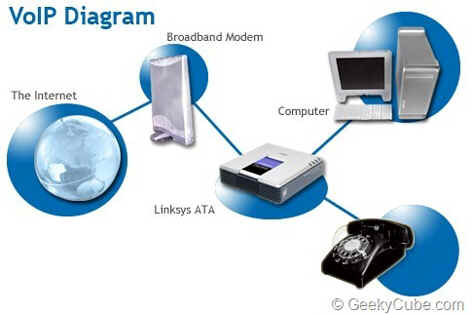Neeraj Dubey
In today’s world of Information technology, with the advent of internet, communication services and other high speed communication mediums, it becomes very easy to share, access the information globally across the world quickly, efficiently and in most economical way. If we go few years back, to make a STD or an ISD calls using a traditional telephone, one had to spend big amount of money, but with the introduction of latest Internet communication services, it becomes possible now days for human to talk to anyone with in the country or globally free of cost or by spending very small amount.
Internet Telephony refers to communications services – Voice, fax, SMS and/or Voice-messaging applications- that are transported via the Internet, rather than the public switched telephone network (PSTN). Voice over Internet Protocol (VoIP) is one of a family of Internet technologies, communications protocols and transmission technologies for delivery of voice communications and multimedia sessions over Internet protocol (IP) networks such as the Internet. In other words we can say that VoIP is a technology used by IP- telephony that allows you to make voice calls using a broadband Internet connection instead of a regular (or analog) phone line. Some VoIP services may only allow you to call other people globally using the same service, but other may allow you to call anyone who has a telephone number including local, long distance, mobile and international numbers. Other terms which are often used synonymously with VoIP are IP telephony or Internet telephony.
There are three types of VoIP tools that are commonly used: IP Phones, Software VoIP and Mobile and Integrated VoIP. The IP Phones are the most institutionally established but still the least obvious of the VoIP tools. Of all the Software VoIP tools that exist, Skype is the most famous and commonly used software tool now days. Software VoIP can be further down into three classes or sub-categories; Web-calling, Voice & Video instant messaging and Web conferencing. Mobile and integrated VoIP is just another example of the adaptability of VoIP. VoIP is available on many smart phones and internet devices so even the users of portable devices that are not phones can still make calls or send SMS text messages over 3G or Wi-Fi. Some VoIP services only work over your computer or a special VoIP phone, other services allow you to use a traditional phone connected to a VoIP adapter.
VoIP services convert your voice into a digital signal that travels over the Internet. It allows you to make a call directly from a computer, a special VoIP phone or a traditional phone connected to a special VoIP adapter. In order to have clear voice transmission, a broadband (high speed internet) connection is required. This can be through a cable modem, or high speed services such as DSL or a LAN. In addition to computer system, one must need some VoIP software like Skype and an inexpensive microphone. Special VoIP phones plug directly into your broadband connection and operate largely like a traditional telephone. If you use a telephone with a VoIP adapter, the phone will ring like a traditional telephone; otherwise, if your VoIP service requires you to make calls using your computer, the software supplied by your service provider will alert you when you have an incoming call.
(The author is senior faculty GCET Jammu)


